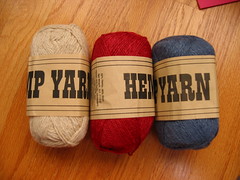 Image by lux2night via FlickrBy Nadia Ruseva
Image by lux2night via FlickrBy Nadia RusevaHemp clothing is strong, long lasting and doesn't wrinkle. It keeps the coolness of linen and has the softness of cotton.
If compared to cotton, hemp fibers are longer, stronger, more absorbent, more mildew and microbe-resistant as well as more insulative. In other words, hemp clothing will keep you warmer in winter and cooler in summer than cotton.
Apart from all these qualities, hemp is one of the most ecologically friendly plants. When grown organically, hemp fiber 'breathes' and is biodegradable. Briefly, hemp clothing looks great, feels good, and protects the planet, too.
From field to fabric - natural fiber clothing
Hemp is one of the most ecologically friendly fibers. Hemp plant doesn't need pesticides as it is naturally pest resistant. When hemp is grown in rotation, it has been known to reduce the pests in future crops. Hemp does not require herbicides, because it is grown so densely that other plants can't co-live with it.
Finally, hemp needs little or no fertilizers and it returns most of the nutrients it takes from the soil. All this makes hemp easy to be grown organically. On top of it, the plant grows between 80-120 days and adjusts to many climate zones.
From fabric to clothing - how hemp turns into organic clothing
In creating eco-friendly, organic hemp clothing, growing is only part of the job. Turning fiber into fabric and fabric into hemp clothing must also be done using processes that are healthy both to the individual and the environment.
Modern methods, however, mostly rely on chemical rather than mechanical processes because they save time and money. For hemp clothing to be considered organic none of the processes in creating hemp fabric should involve synthetic chemicals.
Hemp clothing can be dyed or stay with its "natural" color, which is simply the natural beige color of the hemp fibers after processing. That's why hemp clothes with a "natural" color can vary greatly in shades. By the way, hemp fibers are more absorbent to dyes and better screen out UV rays than cotton. This means that the color of hemp clothing fades more slowly than the color of cotton.
Finally, hemp can be made into many fabrics, including linen. When mixed with cotton, linen, or silk, hemp provides a sturdier, longer lasting textile of high quality and softness.
Is your hemp clothing really organic?
In case you want to know for sure if the hemp clothes you buy are really organic, look for an organic certification label. Because the National Organic Program standards apply to food only, you will not see a USDA Organic seal on clothes. Instead, look for the label of the Global Organic Textile Standard (GOTS). While other eco-labels for clothing and fabrics address raw materials, or chemical finishes, or labor standards, the GOTS certification is the ONLY one that addresses all of the processes.
Nadia Ruseva is a mom, who in search of some tips to raise her child healthy, found a whole new world of inspiration and ideas about how to be healthy and beautiful inside and out... about how to make a difference.
Her website I Prefer Organic is about healthy, natural, eco-friendly and organic alternatives to conventional products as well as tips, recipes and reviews related to organic and sustainable living, fair trade and vegan products.
Visit Nadia to have a chat, discuss a cause, share a view or just to look around for something interesting or inspiring.
Article Source: http://EzineArticles.com/?expert=Nadia_Ruseva
http://EzineArticles.com/?Hemp-Clothing---Your-Second-Natural-Skin&id=6743820

No comments:
Post a Comment